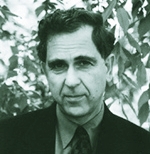
Recently, there's been a debate among some liberal writers about the problems with the term "soft power," which lends itself to misunderstanding as being "soft" in the sense of weak and ineffectual. Others suggest "smart power," which may well be a better term for political leaders to use, and still others prefer "principled power."
If we set aside the question of what's a good slogan and instead consider what's a good conception of power, then I think "principled power" is on the right track. It implies not just that power ought to be used in a principled way, but that the power of a liberal society grows directly out of its principles -- first of all, out of its principles of constitutional constraint (the idea that constitutionally limited power can be more powerful than unlimited power); and second, out of its principles of equality and social inclusion.
The experience of recent years ought to reinforce those convictions. Bush hasn't trespassed constitutional limits with marvelous results; he's degraded American power in both senses of the word "degrade." And a more inclusive conception of our interests (inclusive internationally as well as at home) has a far greater chance to achieve the ends Americans want. This is why I argue in Freedom's Power for a liberalism that takes power (as well as rights and justice) seriously. Among the various conceits of conservatism is that it alone knows power, when it's actually failed on the very ground it sees as its own. There has been no better time to make that case than this election year.
Labels: American politics, foreign policy
May 6, 2008

When the paperback edition of Freedom’s Power comes out in August, the subtitle will be The History and Promise of Liberalism. Unlike the original subtitle, The True Force of Liberalism, the new one should make it clear that the book is a history of the liberal tradition as well as an argument about its possibilities.
Here’s my thinking about the change. Many people make an instant judgment about a book from its title and subtitle and never read a word of the text. I wanted to appeal to a broad audience, to put freedom back at the center of liberalism, and to reclaim the idea and image of strength from the right, but the phrase “freedom’s power” carries two primary risks. The first is a mistaken impression of the book’s viewpoint. On seeing the words “freedom” and “power,” some readers may infer the book is conservative. And, second, they may regard the title as mere rhetoric and infer that the book is insubstantial. Both the original and new subtitles clarify the viewpoint, but The History and Promise of Liberalism should help in conveying the book’s substance and seriousness. (I hope it also has the effect of winning more of an audience among historians.)
When I began the book, the working title was “Liberalism and Power,” which I soon realized led to a misunderstanding that I was writing about how liberals could regain power. That misunderstanding would have played into the hands of right-wingers who argue that power is all liberals want. Along the way I tested out various other titles for the book but ultimately arrived at Freedom’s Power because it expresses something important about liberalism that is at the core of the book and that I don’t think other writers have emphasized enough.
Liberalism has an implicit theory of power—that is, a theory about how to create the power necessary to achieve the ends of freedom, equality, and the public good. Constitutional liberalism shows us how a government can be “strong but constrained—indeed, strong because constrained.” And modern democratic liberalism shows us how a more inclusive and comprehensive conception of freedom can contribute further to the overall capacities of a society both to defend itself and to realize its ideals.
Many people will simply read the title Freedom’s Power as referring to the power of freedom—and although that is not the whole meaning, it is not a mistaken interpretation. As I write in the Preface, “The free encounter of conflicting ideas, the methods of organized skepticism, and the system of economic and democratic political competition have been rich sources of knowledge, abundance, and human possibility. They are part of the story of freedom’s power.” But the book is also about the proposition “that freedom requires power in the form of a strong and capable constitutional state … In a sense, the liberal state and its laws are freedom’s power, the indispensable basis of freedom’s survival. Liberalism isn’t just a set of fine aspirations. Historically, it has emerged from the pressures of political conflict, domestic and international, not least of all from the pressures of war. Freedom’s Power, therefore, is about both the power that free societies generate and the power that they demand.”
Did I make a mistake in the title? Is the effort to claim the terms “freedom” and “power” for liberalism too much at odds with the dominant sensibility of “progressives”? Or do people just see the title Freedom’s Power as empty rhetoric? Let me know.
Labels: freedom


